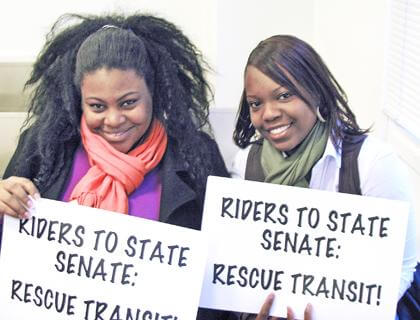By Philip Newman
The state Senate, led by Majority Leader Malcolm Smith (D−St. Albans) presented a proposal it said would rescue the financially beleaguered MTA from imminent Draconian service cuts and fare hike. But the plan was immediately condemned by transit officials, elected officials and business leaders, some of whom found the Senate’s math faulty.
The Metropolitan Transportation Authority instead appears to be holding out hope for the Ravitch Plan.
“The MTA remains focused on pursing the Ravitch Commission’s comprehensive plan, which puts the transit system back on solid fiscal ground for the long−term,” said MTA spokesman Aaron Donovan. “We appreciate the Senate’s engagement on this issue and hope that agreement can be reached before March 25 on a plan that ensures we can continue to operate, maintain and expand the transit system that is the lifeblood of our economy.”
The condemned plan, announced by Smith in Albany after the Senate declared the proposal for East River bridge tolls dead, provides a payroll tax but no immediate money for the MTA Capital Plan.
Smith said the Senate plan would mean no service cutbacks and a 4 percent fare increase. It would also provide a payroll tax of 25 cents on every $100 in a 12−county area served by the MTA.
The Ravitch Plan to rescue the MTA had specified 34 cents per $100.
But MTA Chairman Dale Hemmerdinger said the Senate plan was “a billion dollars short” of what was needed and would actually mean a 17 percent — not 4 percent — increase in transit fares.
A group of transit, business and state officials who shared the stage with Gov. David Paterson at the state Capitol used phrases such as “disappointing,” “irresponsible” and “slap dash” to describe the Senate plan.
State Assembly Speaker Sheldon Silver (D−Manhattan) said, “During the 1970s fiscal crisis, we stopped investing in the long−term needs of our mass transit system. It was a terrible mistake and had a devastating impact on the city and the millions of New Yorkers who depend on mass transit.”
Paterson cautioned against postponing decisions such as allocating money required for the MTA Capital Plan, which funds big projects like the Second Avenue subway and the East Side Access in Manhattan.
After days of discussions, the Senate leadership late Monday night abandoned efforts to get enough support to vote to approve tolls on 13 East River bridges. At least five Democratic senators had refused to go along with the bridge tolls.
The bridge tolls were one of two major cash−raising elements of the Ravitch Commission’s recommendations to rescue the MTA, which has a budget gap of $1.28 billion. The MTA had said if no legislative help was forthcoming by its monthly board meeting March 25, it would go ahead with its doomsday plan of service cuts, including the shutdown of two subway lines and 20 bus lines and near−abolition of some overnight service along with fares hikes from 23 percent to 30 percent. Layoffs would include 1,100 MTA employees.
After hearing Smith explain that the Senate was “changing the paradigm” of the MTA in dealing separately with money needed for the Capital Plan, Paterson said leaving such a thing until later was not acceptable.
“This needs to be addressed now,” Paterson said.
Smith criticized the MTA for what he called lack of transparency and said the agency had been reluctant to provide financial information the Senate had asked for. Smith said the Senate also wanted to know more details about long−term needs of the MTA before issuing a “blank check.”
The MTA, for its part, said at its emergency meeting on March 13 that Gary Dellaverson, its MTA chief financial officer, spent several days in Albany answering questions about the agency’s finances.
“We have made every effort to be transparent,” Hemmerdinger said.
City Comptroller William Thompson called the Senate plan “an important first step” in rescuing the MTA and suggested adoption of his plan for taxes according to the weight of vehicles.
Smith last week questioned the validity of the March 25 deadline, after which the MTA said it would put into effect severe service cuts and fare hikes of as much as 30 percent.
Hemmerdinger said there was nothing artificial about the day. He said it would take weeks to reprogram and reset thousands of turnstiles and vending machines and carry out untold kinds of changes.
Andrew Albert, a non−voting member of the MTA board, said the effects of a near−gutting of the transit system would be far−reaching.
“This transportation system affects thousands of people who seldom ride the subway or bus and thousands more who never ride it. It’s the lifeblood of our economy.”
Reach contributing writer Philip Newman by e−mail at news@timesledger.com or phone at 718−229−0300, Ext. 136.



































